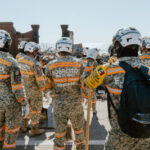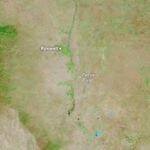Is Rocky Point, Mexico safe, especially for LGBTQ+ travelers? Absolutely! At gaymexico.net, we understand that safety is a top priority when planning your travel, and we’re here to provide you with the information you need to have a fantastic and secure vacation in Rocky Point. Explore gay-friendly resorts, vibrant nightlife, and the warm embrace of the local community, ensuring a memorable experience in this beautiful Mexican destination.
1. What Factors Determine How Safe Rocky Point Mexico Is?
Generally, Rocky Point is considered a safe destination, particularly when sticking to well-traveled routes and tourist areas; safety in Rocky Point depends on various factors. Staying informed and exercising caution are the keys to a secure and enjoyable visit.
- Location: Most incidents occur outside tourist zones.
- Time of Day: Traveling during daylight hours is generally safer.
- Roads Used: Stick to Highway 8 from Lukeville, AZ.
- Awareness: Be aware of your surroundings and avoid risky behavior.
- Police Interaction: Be respectful and prepared for potential interactions.
2. What Does the U.S. State Department Say About Travel To Sonora, Mexico?
The U.S. State Department issues travel advisories for every country, including Mexico, with color-coded risk levels. The U.S. State Department advises Americans to “reconsider travel” to the State of Sonora, Mexico, which includes Rocky Point.
- Advisory Level: “Reconsider Travel” for the entire state of Sonora.
- Highway 8 Exception: No major incidents reported on Highway 8.
- General Caution: Advised to exercise caution throughout Sonora.
- Tourist Areas: Crime is less frequent in tourist areas.
- Official Website: Check the U.S. State Department’s website for updated advisories.
3. Which Specific Routes Are Safe for Driving to Rocky Point?
For driving to Rocky Point, Highway 8, which runs directly between Lukeville, AZ, and Puerto Penasco, is the safest route due to the relative lack of reported incidents. Taking the safe route is crucial for peace of mind.
- Highway 8: Direct route from Lukeville, AZ, to Puerto Penasco.
- Highway 2 Avoidance: Highway 2 from Nogales is less safe due to reported incidents.
- Daytime Travel: Drive during daylight hours for enhanced safety.
- Border Crossing: Lukeville crossing is generally quick and safe.
- Insurance: Ensure you have Mexican car insurance.
4. Are There Any Recent Incidents Affecting Safety in Rocky Point?
While Rocky Point is generally safe, there have been isolated incidents, primarily on Highway 2, that prospective visitors should be aware of to make informed decisions. No incidents were reported on Highway 8.
- Highway 2 Incidents: Three deadly incidents in 2023/2024.
- Lukeville Border Crossing: Remains open and operational.
- No Highway 8 Attacks: No major attacks reported on the direct route.
- Police Harassment: Occasional reports of harassment by Mexican police.
- Stay Updated: Keep informed of recent incidents before traveling.
5. What Precautions Should LGBTQ+ Travelers Take in Rocky Point?
Like anywhere, LGBTQ+ travelers should exercise general safety precautions and be aware of cultural norms, but Rocky Point is generally welcoming. Common sense and respect go a long way.
- General Awareness: Be aware of surroundings, especially at night.
- Public Affection: Exercise discretion in public displays of affection.
- LGBTQ+ Venues: Look for LGBTQ+-friendly establishments for safe socializing.
- Local Laws: Understand local laws and customs regarding LGBTQ+ rights.
- Emergency Contacts: Keep emergency contacts and information handy.
6. What Are the General Safety Tips for Driving to Rocky Point?
Driving to Rocky Point requires some basic safety measures, such as avoiding speeding, traveling during the day, and never carrying firearms or illegal substances. These precautions minimize risks.
- Speed Limits: Adhere to speed limits to avoid police stops.
- Daylight Travel: Drive during daylight hours for better visibility.
- No Firearms/Drugs: Never bring guns or recreational drugs.
- Police Interactions: Be respectful and cooperative if stopped.
- Cash Donations: Have small cash for donation bins to avoid scrutiny.
7. How Can I Avoid Police Harassment in Mexico?
To minimize the risk of police harassment, drive cautiously, avoid violations, and remain polite and respectful during any interactions. Staying calm and knowing your rights helps.
- Obey Traffic Laws: Strict adherence to speed limits and traffic signals.
- Documentation: Keep car and personal documents readily available.
- Polite Demeanor: Remain calm and polite during interactions.
- Refuse Bribes: Never offer bribes; ask for official tickets.
- Report Issues: Document and report any instances of harassment.
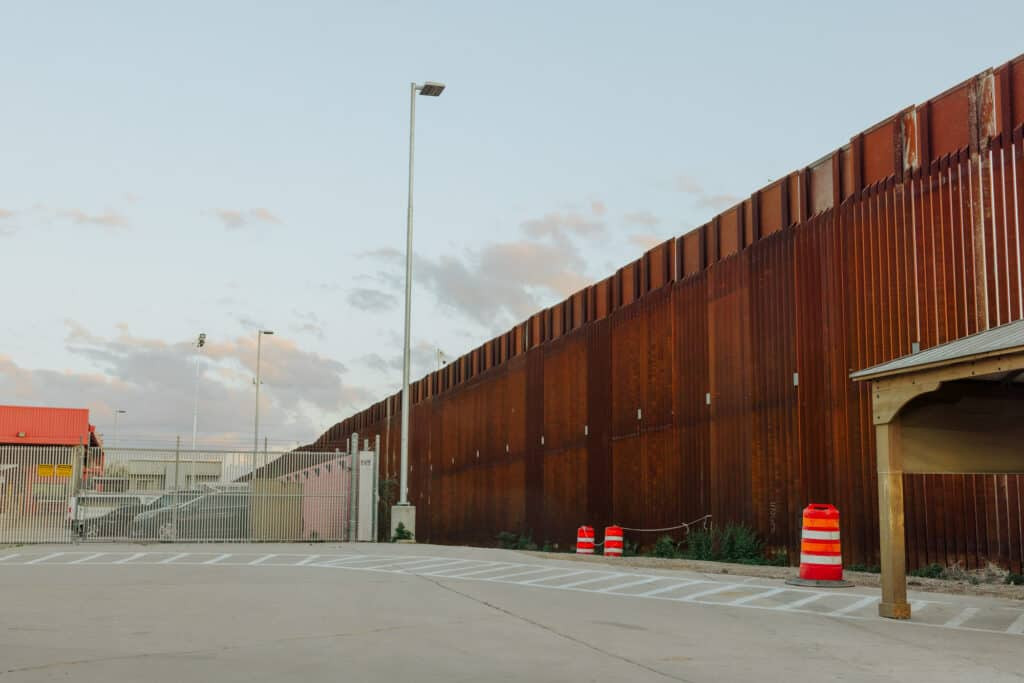 Highway 8 leading to Rocky Point Mexico is well maintained and generally considered safe for travel
Highway 8 leading to Rocky Point Mexico is well maintained and generally considered safe for travel
8. What Should I Do If Stopped by Police in Rocky Point?
If stopped by police, stay calm, be respectful, and ask for the officer’s name and badge number. Knowing how to handle the situation can prevent escalation.
- Stay Calm: Remain composed and speak respectfully.
- Identification: Show driver’s license, car registration, and insurance.
- Ask for Information: Request the officer’s name and badge number.
- Avoid Admissions: Do not admit to any wrongdoing without legal advice.
- Document Details: Record the incident details, including time, location, and officer information.
9. What Tourist Areas Are Considered the Safest in Rocky Point?
The safest areas in Rocky Point are typically the main tourist zones, such as Sandy Beach, the Malecon, and resort areas. These areas have increased security and are well-patrolled.
- Sandy Beach: Popular beach area with many resorts.
- Malecon: Waterfront area with shops, restaurants, and activities.
- Resort Areas: Gated communities with private security.
- Downtown: Busy area with tourist-friendly amenities.
- Public Spaces: Well-lit and populated areas are generally safer.
10. How Has the Closure of the Lukeville Border Crossing Affected Safety?
The temporary closure of the Lukeville border crossing did not reflect safety concerns but rather resource allocation issues, and it has since reopened, restoring normal travel routes. Understanding the reasons behind the closure clarifies the situation.
- Closure Reason: Due to CBP reassigning staff to handle migrant surge.
- No Safety Issue: Not related to violence or security threats.
- Reopened: The crossing has reopened, restoring normal traffic flow.
- Economic Impact: The closure negatively impacted Rocky Point’s tourism.
- Alternative Routes: During closure, travelers used routes through Nogales or San Luis.
11. What Are the Key Differences in Safety Between Highway 8 and Highway 2?
Highway 8 is generally considered safer due to fewer reported incidents, while Highway 2 has seen several deadly attacks, making it a less advisable route. Choosing the right route is crucial.
- Highway 8 Safety: Fewer reported incidents, direct route from Lukeville.
- Highway 2 Risks: Higher incidence of violent crime, avoid if possible.
- Travel Advisories: State Department advises caution on both highways, but incidents differ.
- Local Advice: Consult local sources for up-to-date safety information.
- Route Planning: Plan your route carefully, considering recent incidents.
12. Are There Specific Times of Year When Rocky Point Is Safer to Visit?
Generally, Rocky Point is consistently safe throughout the year, but being informed about local events and conditions helps in planning a secure trip. Staying updated is key.
- Consistent Safety: No significant seasonal changes in safety.
- Event Awareness: Be aware of local events that may affect crowds and security.
- Weather Conditions: Consider weather conditions, especially during hurricane season.
- Off-Peak Travel: Fewer crowds during off-peak seasons may enhance safety.
- Local Advice: Seek advice from locals regarding current conditions.
13. What Kind of Car Insurance Do I Need for Driving to Rocky Point?
Mexican car insurance is required when driving to Rocky Point, as U.S. insurance policies are typically not valid in Mexico. Proper insurance coverage is essential for legal compliance.
- Mexican Insurance: Required to drive legally in Mexico.
- U.S. Policies: Generally not valid in Mexico.
- Rental Car Coverage: Check if rental agreement includes Mexican insurance.
- Border Vendors: Insurance can be purchased near the border.
- Online Purchase: Purchase Mexican insurance online before your trip.
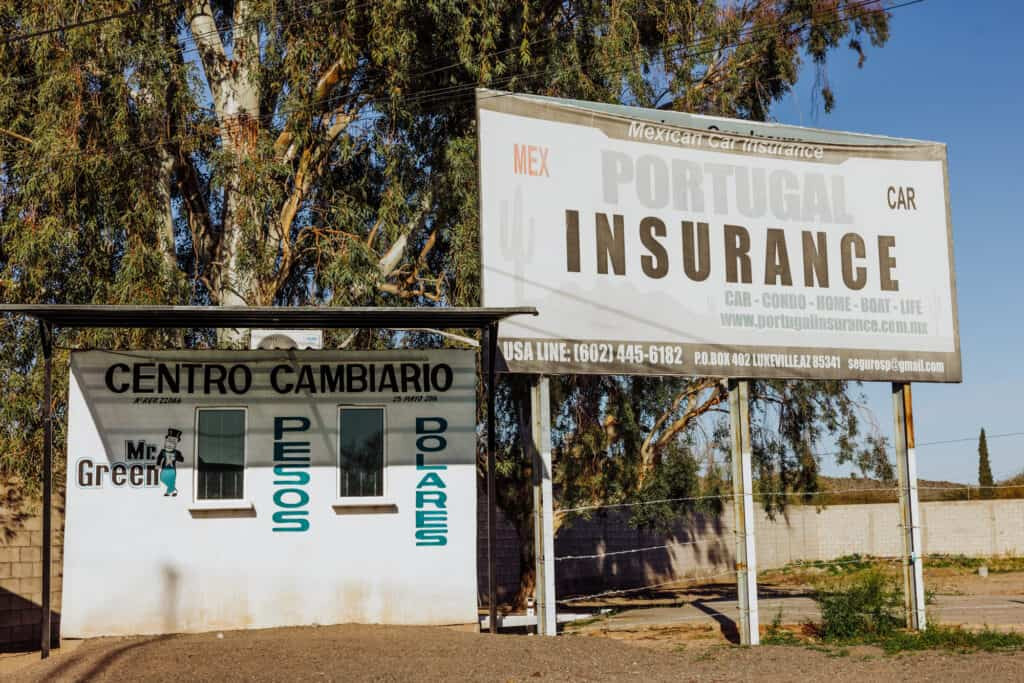 Mexican insurance storefronts can be found near the border, offering necessary coverage for travel to Rocky Point
Mexican insurance storefronts can be found near the border, offering necessary coverage for travel to Rocky Point
14. How Can I Stay Updated on the Latest Safety Conditions in Rocky Point?
Staying updated on safety conditions can be achieved through official travel advisories, local news sources, and community forums. Knowledge is power.
- U.S. State Department: Regularly check travel advisories.
- Local News: Monitor local news outlets for recent reports.
- Community Forums: Participate in travel forums for real-time updates.
- Social Media: Follow local authorities and travel groups on social media.
- Embassy Information: Keep contact information for the U.S. Embassy in Mexico.
15. What Emergency Services Are Available in Rocky Point?
Rocky Point offers various emergency services, including police, medical facilities, and fire departments. Knowing how to access these services is crucial.
- Police: Local police available for security issues.
- Medical Facilities: Hospitals and clinics for medical emergencies.
- Fire Department: Responds to fire-related emergencies.
- Emergency Numbers: Keep local emergency numbers handy.
- Embassy Assistance: U.S. Embassy can provide assistance in emergencies.
16. Are There Any Specific Cultural Norms That LGBTQ+ Travelers Should Be Aware Of?
While Rocky Point is generally welcoming, being aware of cultural norms regarding public displays of affection and dress codes can help LGBTQ+ travelers navigate the area respectfully. Awareness and respect are key.
- Public Displays: Exercise discretion in public displays of affection.
- Dress Codes: Adhere to dress codes in religious or formal settings.
- Language: Learn basic Spanish phrases for respectful communication.
- Local Customs: Respect local customs and traditions.
- Community Engagement: Engage respectfully with the local community.
17. What Role Do Local Police Play in Ensuring Tourist Safety in Rocky Point?
Local police play a significant role in ensuring tourist safety through patrols, checkpoints, and responding to incidents, contributing to a secure environment. Their presence provides reassurance.
- Patrols: Regular patrols in tourist areas.
- Checkpoints: Monitoring traffic and ensuring compliance.
- Incident Response: Responding to and addressing security incidents.
- Community Policing: Engaging with the community to build trust.
- Emergency Assistance: Providing assistance to tourists in need.
18. What Legal Protections Are Available for LGBTQ+ Individuals in Mexico?
Mexico has made significant strides in LGBTQ+ rights, with same-sex marriage legal nationwide and anti-discrimination laws in place, offering legal protections for LGBTQ+ individuals.
- Same-Sex Marriage: Legal throughout Mexico.
- Anti-Discrimination Laws: Protect against discrimination based on sexual orientation.
- Adoption Rights: Same-sex couples have adoption rights in some states.
- Gender Identity: Legal recognition of gender identity.
- Legal Resources: Access to legal resources for LGBTQ+ individuals. According to research from the UCLA Williams Institute, in July 2025, Mexico recognizes same-sex marriage nationwide, providing significant legal protections for LGBTQ+ couples.
19. What Community Resources Are Available for LGBTQ+ Travelers in Rocky Point?
While Rocky Point may have fewer specific LGBTQ+ community resources compared to larger cities, online forums and social media groups can provide connections and support for travelers.
- Online Forums: Connect with other LGBTQ+ travelers online.
- Social Media Groups: Join local and travel-related social media groups.
- LGBTQ+ Venues: Identify LGBTQ+-friendly bars and clubs.
- Community Events: Attend local events to meet community members.
- Support Networks: Utilize online networks for support and information.
20. How Do Local Attitudes Toward LGBTQ+ Individuals Impact Traveler Safety?
Local attitudes in Rocky Point are generally accepting, but discretion is still advised, particularly in more conservative areas, to ensure personal safety and comfort.
- General Acceptance: Most locals are accepting of LGBTQ+ individuals.
- Conservative Areas: Exercise discretion in more conservative areas.
- Public Displays: Limit public displays of affection.
- Respectful Engagement: Engage respectfully with locals.
- Positive Experiences: Many LGBTQ+ travelers report positive experiences.
21. What Are the Best Ways to Blend In and Avoid Drawing Unwanted Attention?
Blending in involves respecting local customs, dressing modestly in certain areas, and avoiding behaviors that might attract unwanted attention. Respect and awareness are key.
- Respect Local Customs: Be mindful of local traditions.
- Dress Modestly: Dress conservatively in religious or formal settings.
- Avoid Flashy Displays: Avoid displays of wealth that may attract attention.
- Be Polite: Be courteous and respectful in interactions.
- Learn Basic Phrases: Learning basic Spanish phrases can show respect.
22. What Can I Do to Support the Local LGBTQ+ Community While Traveling?
Supporting the local LGBTQ+ community can involve patronizing LGBTQ+-owned businesses, attending local events, and donating to local organizations.
- Support LGBTQ+ Businesses: Patronize LGBTQ+-owned establishments.
- Attend Local Events: Participate in community events.
- Donate to Organizations: Support local LGBTQ+ organizations.
- Spread Awareness: Share positive experiences and promote inclusivity.
- Engage Respectfully: Interact respectfully with community members.
23. What Types of Scams Should Tourists Be Aware Of in Rocky Point?
Tourists should be aware of common scams such as inflated taxi fares, fake police stops, and overpriced goods. Vigilance and preparation can help prevent these issues.
- Taxi Scams: Agree on fares before riding.
- Fake Police: Verify the officer’s identity.
- Overpriced Goods: Shop around and compare prices.
- ATM Skimmers: Use ATMs at reputable banks.
- Begging Scams: Be cautious when approached by beggars.
24. Are There Any Specific Laws That LGBTQ+ Travelers Should Know About?
LGBTQ+ travelers should be aware of Mexico’s anti-discrimination laws and same-sex marriage legalization, but also understand local enforcement and attitudes.
- Anti-Discrimination Laws: Protect against discrimination based on sexual orientation.
- Same-Sex Marriage: Legal throughout Mexico.
- Local Enforcement: Understand how laws are enforced locally.
- Legal Resources: Know where to access legal assistance if needed.
- Cultural Context: Be aware of cultural attitudes toward LGBTQ+ individuals.
25. What Resources Does gaymexico.net Provide for LGBTQ+ Travelers to Mexico?
Gaymexico.net offers a variety of resources, including guides to LGBTQ+-friendly destinations, information on local events, and community connections, ensuring a well-informed and connected travel experience.
- Destination Guides: Information on LGBTQ+-friendly cities and towns.
- Event Listings: Details on local LGBTQ+ events and festivals.
- Community Connections: Links to local LGBTQ+ groups and organizations.
- Travel Tips: Advice on safe and enjoyable travel in Mexico.
- Personal Stories: Sharing experiences from other LGBTQ+ travelers.
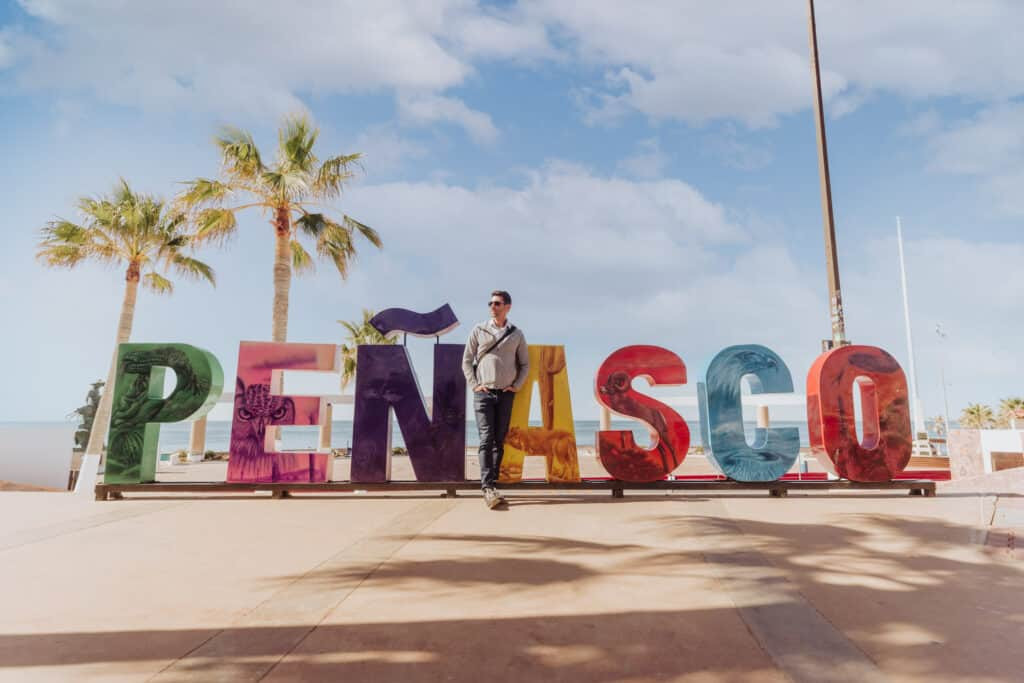 Puerto Penasco offers beautiful beaches and resorts, making it a popular destination for tourists
Puerto Penasco offers beautiful beaches and resorts, making it a popular destination for tourists
26. How Can I Ensure My Accommodation Is LGBTQ+-Friendly in Rocky Point?
To ensure LGBTQ+-friendly accommodations, look for certifications, read reviews, and contact the hotel directly to confirm their policies and attitudes.
- Check Certifications: Look for LGBTQ+ travel certifications.
- Read Reviews: Check online reviews for feedback from other LGBTQ+ travelers.
- Contact Hotel Directly: Inquire about LGBTQ+ policies.
- Book LGBTQ+ Hotels: Choose hotels known for being LGBTQ+-friendly.
- Confirm Policies: Ensure the hotel has inclusive policies.
27. What Activities and Attractions Are Recommended for LGBTQ+ Travelers in Rocky Point?
Recommended activities include beach visits, exploring the Malecon, water sports, and visiting local restaurants and bars, ensuring a diverse and enjoyable experience.
- Beach Visits: Enjoy the beaches and water activities.
- Explore Malecon: Visit shops, restaurants, and bars along the waterfront.
- Water Sports: Participate in activities like snorkeling and jet skiing.
- Local Restaurants: Dine at LGBTQ+-friendly restaurants.
- Nightlife: Explore local bars and clubs.
28. What Role Does the Tourism Industry Play in Promoting Safety for LGBTQ+ Travelers?
The tourism industry can promote safety by training staff, implementing inclusive policies, and supporting LGBTQ+ events, creating a welcoming environment.
- Staff Training: Training staff on LGBTQ+ inclusivity.
- Inclusive Policies: Implementing non-discrimination policies.
- Event Support: Supporting LGBTQ+ events and festivals.
- Marketing Campaigns: Featuring LGBTQ+ travelers in marketing materials.
- Partnerships: Partnering with LGBTQ+ organizations.
29. How Can I Report a Safety Incident in Rocky Point?
Safety incidents can be reported to local police, the U.S. Embassy, and through online reporting platforms, ensuring proper documentation and response.
- Local Police: Report incidents to the local police.
- U.S. Embassy: Contact the U.S. Embassy for assistance.
- Online Platforms: Use online platforms to report incidents.
- Document Details: Keep detailed records of the incident.
- Seek Legal Advice: Consult with legal professionals if necessary.
30. What Steps Can Resorts and Hotels Take to Ensure LGBTQ+ Safety?
Resorts and hotels can ensure LGBTQ+ safety by implementing inclusive policies, training staff, and creating a welcoming atmosphere, demonstrating their commitment to inclusivity.
- Inclusive Policies: Implement non-discrimination policies.
- Staff Training: Train staff on LGBTQ+ inclusivity.
- Welcoming Atmosphere: Create a safe and welcoming environment.
- Promote Inclusivity: Publicly promote LGBTQ+ inclusivity.
- Support LGBTQ+ Events: Support local LGBTQ+ events and organizations.
In conclusion, Rocky Point can be a safe and enjoyable destination for LGBTQ+ travelers by staying informed, taking necessary precautions, and utilizing available resources. For more detailed guidance and to connect with a supportive community, visit gaymexico.net today and start planning your adventure with confidence! Address: 3255 Wilshire Blvd, Los Angeles, CA 90010, United States. Phone: +1 (213) 380-2177.
Frequently Asked Questions About Safety in Rocky Point
-
Is Rocky Point safe for tourists in general?
Yes, Rocky Point is generally safe for tourists who stick to well-traveled areas and take standard safety precautions. -
What areas should I avoid in Rocky Point?
Avoid traveling on Highway 2, especially at night, and be cautious in areas outside the main tourist zones. -
How do I handle police interactions in Rocky Point?
Remain calm and respectful, provide necessary documents, and avoid offering bribes. -
What insurance do I need for driving to Rocky Point?
You need Mexican car insurance, as U.S. policies are not valid in Mexico. -
How can I stay updated on safety conditions in Rocky Point?
Check U.S. State Department advisories, local news, and community forums. -
What emergency services are available in Rocky Point?
Local police, medical facilities, and fire departments are available for emergencies. -
Are there LGBTQ+-friendly accommodations in Rocky Point?
Check certifications, read reviews, and contact hotels directly to confirm their policies. -
What activities are recommended for LGBTQ+ travelers?
Enjoy beaches, explore the Malecon, participate in water sports, and visit local restaurants and bars. -
What can I do to support the local LGBTQ+ community in Rocky Point?
Patronize LGBTQ+-owned businesses, attend local events, and donate to local organizations. -
Where can I find more information about LGBTQ+ travel in Mexico?
Visit gaymexico.net for guides, event listings, community connections, and travel tips.
